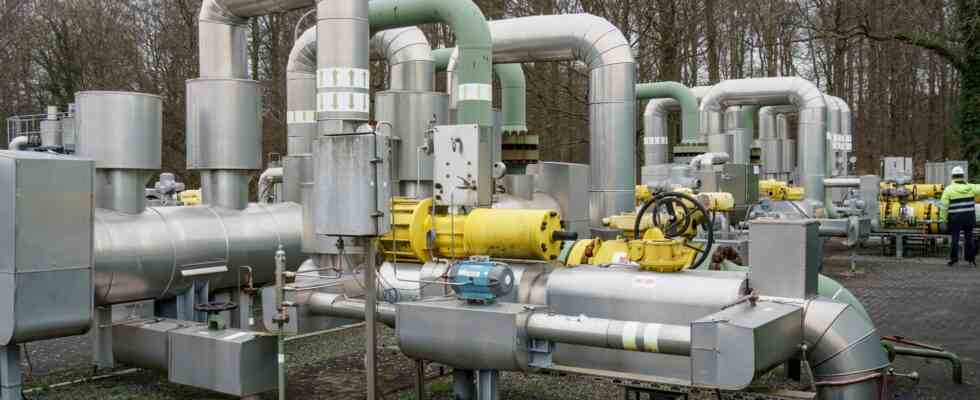Status: 10/25/2022 10:46 am
In the crisis, many people want to change their energy provider – but many municipal utilities can no longer cope with the requests. Some reject new customers or no longer grant follow-up contracts to existing customers.
Many customers are currently changing their gas supplier – either because they have to or because they have been looking for and found a cheaper offer due to the extreme energy price increases. This influx of new customers poses major problems for utilities in Germany.
Several municipal utilities are currently unable to accept new customers or are letting contracts with customers who do not live in their supply area expire, as a spokesman for the Association of Municipal Companies (VKU) explained. “That applies to the gas supply outside of the basic supply.” Within the basic service, on the other hand, a restriction to existing customers and a refusal of new customers is not legally possible, according to the VKU spokesman.
Stabilization measures for municipal utilities
According to the Energy Industry Act, every household resident in Germany has the right to a basic supply of electricity (low voltage) and gas (low pressure). According to the Energy Industry Act, the basic supplier is the energy company that supplies the most household customers in a region with electricity or gas. These are usually the local municipal utilities or area network operators.
In a joint appeal, local authority and energy associations recently pointed out the problems facing suppliers caused by the energy crisis and called for government support for the companies. As the situation continues to worsen, stabilization measures are needed for municipal utilities and other regional energy suppliers that are accessible in all federal states and offer help in an emergency, according to a letter to the Prime Minister.
In the letter, the leading associations also referred to the influx of customers, which meant that the default suppliers had to procure more energy unplanned – despite the extreme price level. “As understandable as the idea of many people is to fall into the basic service out of concern about rising prices, this undertaking is difficult for the public utility company,” said the VKU spokesman.
Focus on existing customers
So not only have the procurement prices gone up sharply, but also the interim financing costs are increasing, it was said. That is the sum with which Stadtwerke would have to bridge the time between purchasing and selling on to their customers and increasing the discounts. “Both together increase the liquidity needs of the municipal utility, which in turn affects the ability to serve customer requests for electricity and gas,” said the spokesman.
Because the preliminary and interim financing burden increases with the gas quantities to be procured. The result is that more and more municipal utilities are concentrating on supplying their existing customers, according to the VKU representative. “They restrict new customer business, and follow-up contracts are also in question.” At the end of September, Stadtwerke Flensburg announced that it would no longer supply gas to customers who do not live in Schleswig-Holstein. Around 45,000 private customers are affected, and most of the contracts expire at the end of November.
According to the VKU, even if customers can no longer pay their bills, this has consequences for the suppliers: “Payment defaults of more than ten percent can eat up the equity of the public utility and bring them into liquidity problems.”
Change from discount providers to public utilities – at higher prices
The Munich-based Stadtwerkeverbund Thüga also speaks of an unexpectedly large number of new customers who would have to be accepted by discount providers as part of the “replacement supply”. “What is certain is that no customer will be turned away by a basic supplier, but that the municipal utilities and municipal suppliers will fulfill their statutory mandate and supply energy customers safely and reliably even in times of crisis,” said a Thüga spokesman.
However, new customers in particular would have to adjust to higher prices. Currently, more and more of the long-term negotiated gas supply contracts, which are still relatively cheap compared to the current conditions, are expiring. New contracts would have had to be concluded at significantly higher prices. The Federal Association of Consumers had recently reported a multiplication of the number of advice from gas and electricity customers. A spokeswoman said that special difficulties when changing providers were not currently an issue in the consultations.
A spokesman for the comparison portal Verivox explained that the restrictions on new customer business have not only been an issue for municipal utilities since the beginning of the energy crisis, but also for other providers. “We can already see that competition is restricted as a result,” said the spokesman. In view of the extreme price differences, many people are currently using the portal to find out about the prices of the providers.
No more offers for companies
Unlike private households and very small companies, larger and medium-sized companies are not entitled to be replaced by basic suppliers, according to DIHK President Peter Adrian. “We therefore urgently need a replacement supply for companies as well as liquidity protection for the energy suppliers.”
According to Adrian, the security deposits have reached such astronomical heights, analogous to the stock exchange prices, that municipal utilities and other suppliers can no longer make offers to their customers for the supply of electricity and gas. “We therefore need a state guarantee framework as quickly as possible, as was the case with the financial crisis.”
The DIHK President continued to warn: “Calls for help reach us daily from companies across the industry who will no longer get an energy supply contract for the coming year. If no solution is found here, parts of our economy will stand still at the turn of the year.”

